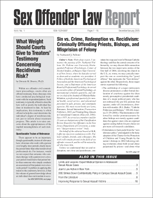To Plead or Not to Plead? Research Reveals Complex Considerations for Sex Crime Defendants
Author: Annabelle Shestak.; Kristy L. Shockley.; Jaime M. Keenan.; Joseph E. Gonzales.
Source: Volume 18, Number 05, August/September 2017 , pp.65-71(7)

< previous article |next article > |return to table of contents
Abstract:
This article presents research that questions the benefit of pleading out for sex crime defendants. Plea bargains are offered in virtually every criminal case, and therefore an empirical understanding of their value and drawbacks is fundamental to a defendant’s decision-making. Because the “horse-trading [between prosecutor and defense counsel] determines who goes to jail and for how long, [plea bargaining] is not some adjunct to the criminal justice system; it is the criminal justice system.” (Missouri v. Frye, 566 U.S. 133, 140, (2012), citing Scott & Stuntz, Plea Bargaining as Contract, 101 Yale L. J. 1909, 1912 (1992).) Indeed, defendants who opt for trial may end up with longer sentences than even Congress or the prosecutor might think appropriate, not because they made the wrong plea-versus-trial decision, but because long sentences are maintained on the books largely for bargaining—not punitive—purposes. The authors, who were the researchers conducting the study described in the article below, untangle crucial threads of the complex weave of decision-making in sex crime plea bargaining.Keywords: Plea Bargains; Social Consequences for Sex Crime Defendants; Lack of “Discount” in Sex Crime Pleas
Affiliations:
1: University of Massachusetts, Lowell (UML); 2: UML; 3: UML; 4: UML.